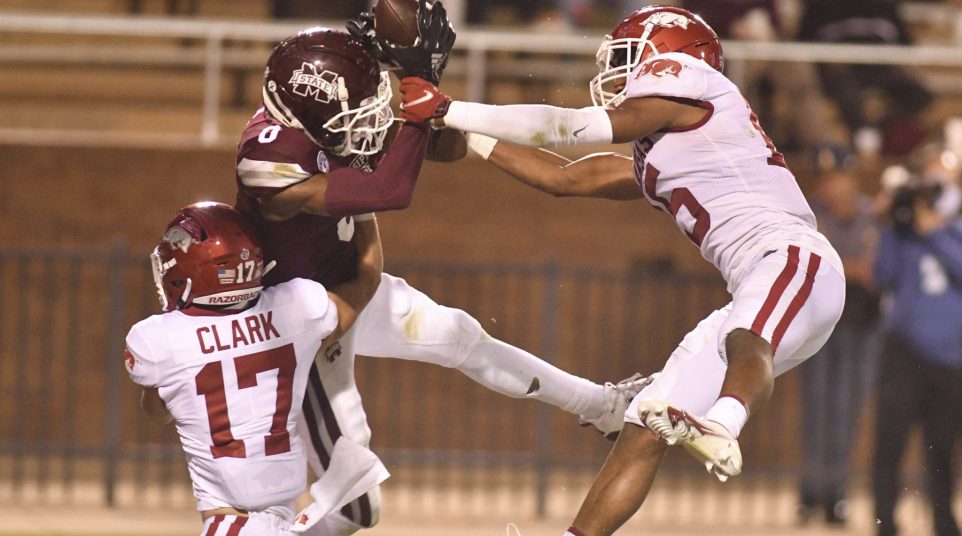
Mississippi State football: Air Raid solved? Nope. Kylin Hill's absence caused Bulldogs to become too 1-dimensional
The notion that Mike Leach’s Air Raid offense totally ignores the running game is not accurate. Sure, his quarterbacks throw the ball on close to 70% of snaps, but with a fast offense that gets more than the usual amount of snaps in a game, there is plenty of time for running the ball.
This is why Kylin Hill’s injury in the first quarter of Saturday’s 21-14 loss to Arkansas was so important. All respect to Dillon Johnson (9 carries, 39 yards) and Jo’quavious Marks (10 carries, 37 yards), but they aren’t exactly at Hill’s level. The preseason All-SEC back rushed for 1,350 yards and 10 scores last season and, while those rushing numbers obviously are coming down in 2020, his presence on the field is just as important if not more so in Leach’s offense.
Barry Odom and the Razorbacks seemingly took a game plan from Leach’s former foe Washington in dropping 8 into coverage and daring KJ Costello to throw a short route or hand it off. In the end, Bulldogs running backs combined for 20 carries, yet you could feel that Sam Pittman’s team wasn’t worried about the ground attack.
So while the popular postgame narrative was that Arkansas solved the Air Raid, the biggest factor was the fact Hill missed most of the game. Otherwise, he would have had ample opportunities, just like in the opener.
Even when Gardner Minshew was lighting up secondaries in 2018 for Washington State, Leach still kept defenses honest. In 8 of the Cougars’ 13 games that season, they rushed more than 20 times and, twice, more than 30. Last season, Wazzu rushed more than 20 times just 5 times, with the maximum being 21 in 2 separate games. In 2017, the Cougars ran the ball at least 25 times in 8 of 13 games.
So it’s not that Leach doesn’t run the ball. And it’s not like Arkansas solved the Air Raid or threw something at Leach that he hasn’t seen.
When your best back is out and the defense stops respecting your rushing attack, it becomes a problem. That was the situation Mississippi State found itself in.
Would the Razorbacks have been able to pull off that 3-man front had Hill been in there? I’m not certain they could have. In fact, there would have been at least one defender assigned to tracking Hill wherever he went. We saw what the back can do in Leach’s offense as he put up some eye-popping numbers in receiving yards in the opener against LSU. As State’s running back coach Eric Mele told SDS, Hill “runs pretty good routes, has a good feel, and he has good hands.” In essence, he is a matchup problem.
Yet, as the Razorbacks proved on Saturday in Starkville, a defense can be really good when an offense is one-dimensional. The Bulldogs finished with 87 rushing yards on 24 attempts, an average of 3.6 yards per carry. No matter how good Costello can be through the air, he’s only that good when State’s best player, and that is Hill, is in.
There’s no question that Hill was missed on Saturday. Any team is going to miss an All-SEC type player, especially one as explosive as he is. If he is to miss more time, even this upcoming week against Kentucky, Leach will have to find someone to fill that void. MSU had no such answers, in the moment, against Arkansas.
Mississippi State needs a running game, or at least the threat of it, and its best back to produce the kind of results Leach’s offense is used to putting on the scoreboard. Otherwise, we could see SEC defenses copying the exact game plan the Razorbacks used to pull the upset.
